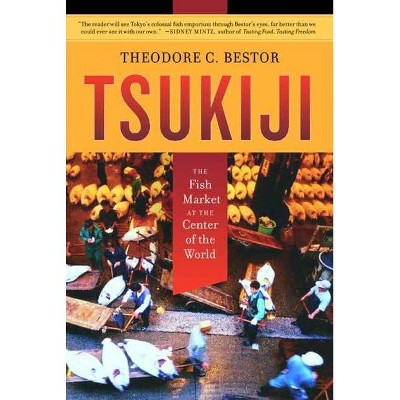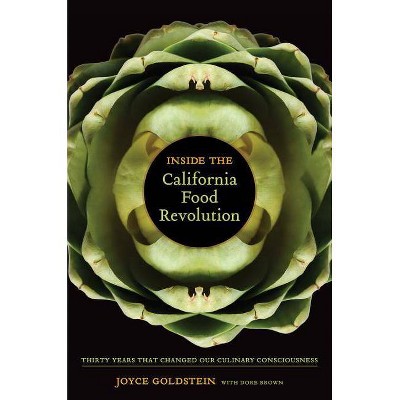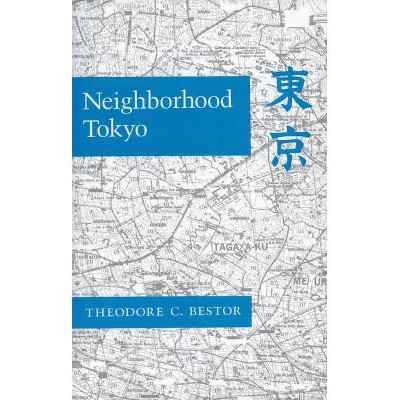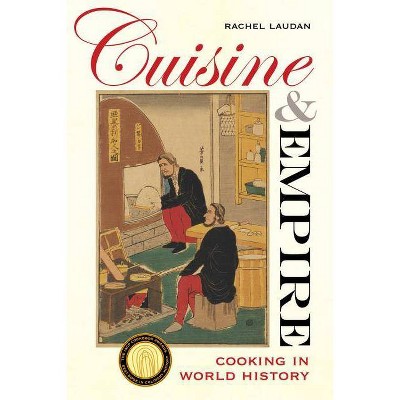Tsukiji - (California Studies in Food and Culture) by Theodore C Bestor (Paperback)

Similar Products
Products of same category from the store
AllProduct info
<p/><br></br><p><b> About the Book </b></p></br></br>"Bestor's vivid and meticulous study of Tokyo's seafood market is at once perhaps the best description we have of a modern, large-scale commodity bazaar, an important contribution to comparative economics, and a powerful analysis of the everyday workings of Japanese culture. As a portrait of a master institution in a complex society, Tsukiji represents a major advance in the anthropological description of contemporary life."--Clifford Geertz, author of "The Interpretation of Cultures" <BR>"This is, quite simply, a masterpiece of ethnography and a jewel of a book. It will prove immediately popular and influential."--William W. Kelly, Professor of Anthropology, Yale University <BR>"Bestor's rich portrait of Tsukiji is set within the larger frame of Tokyo's urban history, helping us see clearly the forces which, over time, resulted in the creation of the world's greatest seafood market. An impressive amount of ethnographic fieldwork turns his fascination with Tsukiji into a first-rate piece of anthropological analysis. The reader will see Tokyo's colossal fish emporium through Bestor's eyes, far better than we could ever see it with our own."--Sidney Mintz, author of "Sweetness and Power" and "Tasting Food, Tasting Freedom" <BR>"This study is a fine example of how key local institutions both drive and reflect larger national and global processes. In showing us the global reach of a major seafood market in Japan, Bestor is able to bring the best practices of ethnography to the abstractions of the economy, thus deepening our sense of how money, commodities, risk and drudgery meet to produce a specific - and brilliantly evoked - cultural economy. This is a rare book, full of treats for both the specialist and the general reader. "--Arjun Appadurai, author of "Modernity at Large"<p/><br></br><p><b> Book Synopsis </b></p></br></br>Located only blocks from Tokyo's glittering Ginza, Tsukiji-the world's largest marketplace for seafood-is a prominent landmark, well known but little understood by most Tokyoites: a supplier for countless fishmongers and sushi chefs, and a popular and fascinating destination for foreign tourists. Early every morning, the worlds of hi-tech and pre-tech trade noisily converge as tens of thousands of tons of seafood from every ocean of the world quickly change hands in Tsukiji's auctions and in the marketplace's hundreds of tiny stalls. In this absorbing firsthand study, Theodore C. Bestor-who has spent a dozen years doing fieldwork at fish markets and fishing ports in Japan, North America, Korea, and Europe-explains the complex social institutions that organize Tsukiji's auctions and the supply lines leading to and from them and illuminates trends of Japan's economic growth, changes in distribution and consumption, and the increasing globalization of the seafood trade. As he brings to life the sights and sounds of the marketplace, he reveals Tsukiji's rich internal culture, its place in Japanese cuisine, and the mercantile traditions that have shaped the marketplace since the early seventeenth century.<p/><br></br><p><b> From the Back Cover </b></p></br></br>Bestor's vivid and meticulous study of Tokyo's seafood market is at once perhaps the best description we have of a modern, large-scale commodity bazaar, an important contribution to comparative economics, and a powerful analysis of the everyday workings of Japanese culture. As a portrait of a master institution in a complex society, Tsukiji represents a major advance in the anthropological description of contemporary life.--Clifford Geertz, author of <i>The Interpretation of Cultures</i><br /><br />This is, quite simply, a masterpiece of ethnography and a jewel of a book. It will prove immediately popular and influential.--William W. Kelly, Professor of Anthropology, Yale University<br /><br />Bestor's rich portrait of Tsukiji is set within the larger frame of Tokyo's urban history, helping us see clearly the forces which, over time, resulted in the creation of the world's greatest seafood market. An impressive amount of ethnographic fieldwork turns his fascination with Tsukiji into a first-rate piece of anthropological analysis. The reader will see Tokyo's colossal fish emporium through Bestor's eyes, far better than we could ever see it with our own.--Sidney Mintz, author of <i>Sweetness and Power</i> and <i>Tasting Food, Tasting Freedom</i><br /><br />This study is a fine example of how key local institutions both drive and reflect larger national and global processes. In showing us the global reach of a major seafood market in Japan, Bestor is able to bring the best practices of ethnography to the abstractions of the economy, thus deepening our sense of how money, commodities, risk and drudgery meet to produce a specific - and brilliantly evoked - cultural economy. This is a rare book, full of treats for both the specialist and the general reader. --Arjun Appadurai, author of <i>Modernity at Large</i><p/><br></br><p><b> About the Author </b></p></br></br><b>Theodore C. Bestor</b> is Professor of Anthropology and Japanese Studies at Harvard University and past President of the American Anthropological Association's East Asian Studies Section and the Society for Urban Anthropology. His publications include <i>Neighborhood Tokyo </i>(1989), <i>Doing Fieldwork in Japan </i>(coeditor, 2003), and How Sushi Went Global <i>in Foreign Policy </i>(2000).
Price History
Cheapest price in the interval: 26.99 on October 22, 2021
Most expensive price in the interval: 26.99 on December 20, 2021
Price Archive shows prices from various stores, lets you see history and find the cheapest. There is no actual sale on the website. For all support, inquiry and suggestion messagescommunication@pricearchive.us




















